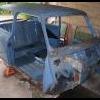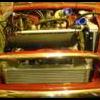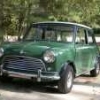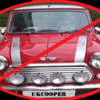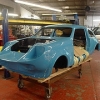
Torque Wrench Question
Best Answer lrostoke , 30 December 2013 - 02:39 PM
http://www.halfords....tegoryId_165469
This one covers a lot of the higher stuff and goes down low enough for the head nuts, but you'd need a smaller one for everything else.
Go to the full post
#1

Posted 30 December 2013 - 01:17 PM
So what is the largest amount of torque used on a mini and any recommendations on wrenchs
Cheers
YetI
#2

Posted 30 December 2013 - 01:21 PM
I think front hub nuts on later minis are the highest required (150lb/ft off the top of my head).
I use an old draper one (had it about 5 years) does all I need :)
#3

Posted 30 December 2013 - 01:28 PM
I think front hub nuts on later minis are the highest required (150lb/ft off the top of my head).
I use an old draper one (had it about 5 years) does all I need :)
I'm fairly sure there's something in the gearbox that needs tightening to 200 ft/lb?
And doesn't the crank pulley go to 200 ft/lb?
I have two torque wrenches, a small one for the lower torques and then a bigger one for the higher torques.
#4

Posted 30 December 2013 - 01:31 PM
Hey guys, I'm trying to work out what torque wrench to buy as the one I do have doesn't measure torque on reverse threads so I nearly killed one of the rear hub threads.
Are you sure it can't be reversed. I find that a bit hard to believe.
My torque wrench looks like it has no reverse mechanism however all you have to do is pull the black knob connected to the 1/2" square drive bit out from the end and push it back in the other side. This in effect flips the torque wrench upside down meaning it works with reversed threads.
#5

Posted 30 December 2013 - 01:40 PM
I think front hub nuts on later minis are the highest required (150lb/ft off the top of my head).
I use an old draper one (had it about 5 years) does all I need :)
I'm fairly sure there's something in the gearbox that needs tightening to 200 ft/lb?
And doesn't the crank pulley go to 200 ft/lb?
I have two torque wrenches, a small one for the lower torques and then a bigger one for the higher torques.
From a quick bit of googleing, I can only find some gearbox ones for 150.
http://www.theminifo...gs-reformatted/
#6

Posted 30 December 2013 - 01:42 PM
I think front hub nuts on later minis are the highest required (150lb/ft off the top of my head).
I use an old draper one (had it about 5 years) does all I need :)
I'm fairly sure there's something in the gearbox that needs tightening to 200 ft/lb?
And doesn't the crank pulley go to 200 ft/lb?
I have two torque wrenches, a small one for the lower torques and then a bigger one for the higher torques.
From a quick bit of googleing, I can only find some gearbox ones for 150.
http://www.theminifo...gs-reformatted/
Yes, that's probably right. But I am sure I read something about 200 lbs. ![]()
#7

Posted 30 December 2013 - 01:43 PM
theres two nuts in the gearbox that are 150 ft/lb,
the flywheel is sometimes quoted as 120ft/lb, but do it to 150 ft lb, maybe a bit more on performance engines,
CV nuts are 150 ft/lb for ones with 2 split pin holes, or 200ftlb with 1 hole.
#8

Posted 30 December 2013 - 02:39 PM Best Answer
http://www.halfords....tegoryId_165469
This one covers a lot of the higher stuff and goes down low enough for the head nuts, but you'd need a smaller one for everything else.
#9

Posted 30 December 2013 - 03:07 PM
I use this and its cheap and accurate with a wide range.....
http://www.tool-net....ue-adaptor.html
Edited by firstforward, 30 December 2013 - 03:07 PM.
#10

Posted 30 December 2013 - 03:39 PM
I have a couple of torque wrenches, both of which were my fathers. I have taken them both to work to confirm their calibration against bench standards we have on our assembly floor. The cheap Chinese wrench I have is not particularly accurate. It is not even linearly "out". In some areas it reads high, in others... low. My older U.S. made wrench has a slight linear error but that allows me to compensate by dialing in a bit more on the scale when needed.
My advice, is to buy a name brand wrench with a good warranty. When you are not using the wrench, be sure to release the internal spring pressure by setting it back to "zero". If possible, check its calibration periodically.
#11

Posted 30 December 2013 - 05:41 PM
I've got 3 of the Halfords advanced ones, I bought the longer one I think just to get the hubs right, and they are all right and left hand thread via a drive that pushes through the head of the tool.
An engineer friend of a friend told me a set of bathroom scales can be used with a foot long breaker bar or something to measure the poundage.
#12

Posted 30 December 2013 - 06:19 PM
http://www.ebay.co.u...=item27b89a0f87
#13

Posted 30 December 2013 - 06:41 PM
The thing to remember with torque wrenches is that they are a calibrated tool, and their calibration is set between 20% and 100% of the quoted maximum, so if it's stated as a maximum of 200lbft, it means its calibrated range is 40 to 200 lbft, the minimum is too high for some jobs and it's not good practice to work to a tools extremes of calibration.
I have 3 torque wrenches which I use every day, one of each of the halfords advanced range, and they have proved reliable and accurate over years of service, having been checked every year.
I have some older Britool wrenches for the 'heavy duty' work in the workshop going up to 250lbft, ideal for hub nuts.
#14

Posted 30 December 2013 - 07:02 PM
Don't drop them and always revert to 0 after use - my dad has a couple of snap on ones and they have lasted literally forever, and are still spot on with regards to accuracy. ![]()
#15

Posted 30 December 2013 - 07:55 PM
A few things:
The two main styles of mechanical clicking torque wrenches within grasp of garage mechanics are:
1) micrometer style. You can recognize this by the way you set it. Usually the whole handle twists against a spring. This style needs to be set to its lowest setting between uses, or it will become uncalibrated. This style is generally more accurate (lower percentage of margin) than the other style, however it is also more sensitive to being dropped, banged around, etc. These can torque left or right threads. But they should never be used to "loosen" a fastener; as you will often exceed the torque setting, and cause calibration issues.
2) split beam style. These are marginally more expensive. They only work in one direction, so reverse thread is an issue. The adjustment is easier, as you are not tightening a spring, there is a steady low force needed to turn the adjustment knob. You can leave this style set between uses without adverse effects. It is less prone to being uncallibrated if dropped. It is (generally) slightly less accurate when properly callibrated.
As for torque wrenches, one that covers a large range (0-200) will be less easy to adjust to specific numbers in the range. Looking at the numbers in putting my car together, I ended up with a micrometer style one that does inch pounds, from something like 12 inch pounds to about 18 foot pounds. And then a split beam style one tha covers from 20 to 100 foot pounds. Then, a cheap-but-well-reviewed ($15) micrometer one to cover the high ranges.
The inch pounds one is handy because it is tiny. The head is even smaller than my 1/4" drive craftsman ratchet heads. I figured that the accuracy was more important when deciding between 11 and 12 foot pounds, etc. I use it less often, so the extra effort to use it isn't a big deal. In my case, the brand is Precision instruments, not sure if they have that also in the UK.
The 20-100 pounds split beam one is nice because it's easy to adjust, I can leave it set between jobs, and it is still somewhat compact compared to my craftsman 3/8" drive ratchets. And, the split beam style can also have flexible heads to get into tighter spots (I don't think the micrometer style ones are as big of an issue). I use this one the most. Also from precision instruments.
And then I have a 50-200 or so pound cheapo micrometer thing. I figured that the bigger fasteners are a bit more tolerant of a larger range of inaccuracy, and that I really do so few of them. It's big and heavy. This is from Harbor Freight, a company known for cheap tools; however this particular wrench seems to be considered surprisingly accurate and consistent, even compared to higher end ones. The whole wrench costs less than a callibration would cost on a high end wrench.
1 user(s) are reading this topic
0 members, 1 guests, 0 anonymous users






